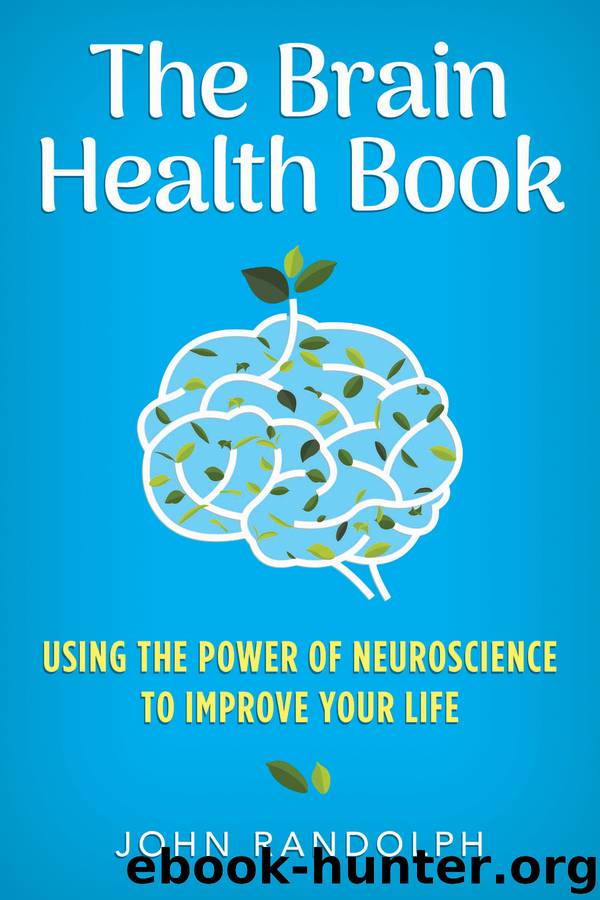The Brain Health Book by John Randolph

Author:John Randolph
Language: eng
Format: epub, mobi
Publisher: W. W. Norton & Company
Published: 2019-10-24T16:00:00+00:00
The Long and the Short of It
Beyond something as concerning as dementia, sleeping too little—or too much—can cause milder cognitive challenges too. And this isn’t necessarily in the context of a diagnosable sleep disorder per se. As one common example, perhaps you tend to curb sleep during the workweek, only to catch up on the weekend. Many people struggle to get all the sleep they need during the week due to ramped-up job demands, schedule changes, or child-care duties. The logic usually goes something like this: I’ll lose a little sleep this week, but I’ll sleep in on Saturday and Sunday and be fine by next week. Sound familiar?
Unfortunately, this logic doesn’t work out so well according to sleep neuroscience. One well-conducted study looked at the effects of restricting sleep to 4 or 6 hours per night for a period of 2 weeks, or—the more extreme experimental condition—completely depriving people of sleep for 2 nights. The findings may serve as a wake-up call, pardon the pun, to those who try to catch up on sleep after a sleep-deprived workweek. The researchers found that sleeping 4 or 6 hours per night soon resulted in various cognitive deficits, including problems with sustained attention, working memory, and information processing speed. Another finding was also revealing: when people were restricted to 4 hours of nightly sleep over the course of 2 weeks, their thinking skills were just as impaired as those in people who were totally sleep deprived for 2 nights. In just a few days, sleeping less than 8 hours per night really hit the brain hard.
People who are short sleepers have another troubling tendency: they feel that their thinking skills are just fine, even though their cognitive performance indicates otherwise. Curiously, this tendency doesn’t apply as much to people who go without a night of sleep—they realize they’re wiped out, both physically and mentally. Your coworker who brags about not sleeping much while completing a project but still being on his game . . . well, he might be a tad mistaken on that assessment.
How about sleeping too much, also known as long sleeping? While there’s nothing wrong with sleeping in from time to time, multiple studies have found that regularly sleeping more than 9 hours per night can have negative effects on problem-solving skills, language, and overall thinking ability. In industrialized nations, this is typically less common than short sleeping, but nevertheless carries a risk of cognitive difficulties if done often.
In terms of general health, short sleeping, particularly sleeping less than 6 hours per night, has been linked to a number of health problems, including an increased risk of diabetes, hypertension, heart disease, and obesity. Some of these conditions have been associated with long sleeping too. Given the problems with inadequate or excessive sleep for physical and brain health, finding ways to maintain the 7- to 8-hour sweet spot is all the more important. Next, we’ll consider some strategies that can help.
Download
This site does not store any files on its server. We only index and link to content provided by other sites. Please contact the content providers to delete copyright contents if any and email us, we'll remove relevant links or contents immediately.
Periodization Training for Sports by Tudor Bompa(8271)
Why We Sleep: Unlocking the Power of Sleep and Dreams by Matthew Walker(6722)
Paper Towns by Green John(5189)
The Immortal Life of Henrietta Lacks by Rebecca Skloot(4587)
The Sports Rules Book by Human Kinetics(4385)
Dynamic Alignment Through Imagery by Eric Franklin(4216)
ACSM's Complete Guide to Fitness & Health by ACSM(4060)
Kaplan MCAT Organic Chemistry Review: Created for MCAT 2015 (Kaplan Test Prep) by Kaplan(4012)
Livewired by David Eagleman(3772)
Introduction to Kinesiology by Shirl J. Hoffman(3769)
The Death of the Heart by Elizabeth Bowen(3620)
The River of Consciousness by Oliver Sacks(3603)
Alchemy and Alchemists by C. J. S. Thompson(3520)
Bad Pharma by Ben Goldacre(3427)
Descartes' Error by Antonio Damasio(3277)
The Emperor of All Maladies: A Biography of Cancer by Siddhartha Mukherjee(3162)
The Gene: An Intimate History by Siddhartha Mukherjee(3098)
The Fate of Rome: Climate, Disease, and the End of an Empire (The Princeton History of the Ancient World) by Kyle Harper(3067)
Kaplan MCAT Behavioral Sciences Review: Created for MCAT 2015 (Kaplan Test Prep) by Kaplan(2986)
